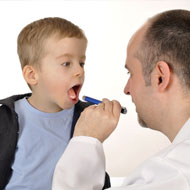What are The Remedies for Frequent Vomiting in Toddlers
Frequent vomiting is called gastro esophageal reflux disease (GERD) and it may affect your toddler. Most toddlers outgrow this condition during their first year. Abdominal pain and irritability during and after eating along with vomiting are the symptoms that can affect a toddler suffering from GERD.
GERD is caused when the oesophageal sphincter, the valve which connects the esophagus to the stomach, is weak or does not function properly. This causes the food and gastric juices to move out from the stomach and into the mouth.
As mentioned earlier, most babies outgrow reflux by their first year because their sphincter muscles become stronger. However, in case frequent vomiting in toddlers continues, it can lead to other problems. The toddlers cannot gain weight as they keep throwing up everything that is consumed. The other problems that may develop are respiratory problems such as wheezing, pneumonia, sinus, and cough at night and ear infections. The stomach acid may also damage the tooth enamel.
Remedies for Frequent Vomiting in Toddlers
There are ways in which you can help your toddler who keeps vomiting. You can give smaller and more frequent meals and make your toddler eat in an upright position and remain upright for half an hour after feeding. Keep track of how your toddler reacts to new foods and avoid spicy and greasy foods.
Simple antacids and low doses of acid suppressors will bring relief to a frequently vomiting toddler, but do not use these unless your doctor prescribes it. In case the child does not respond to the treatment, he or she may need to be examined in order to figure out what is ailing your toddler.
The test will include X-rays of the affected area (called upper GI series) and your toddler might have to drink barium, a chalky substance, to make any damage or obstacle visible in the X-ray.
If your toddler is affected by the rotavirus, keep in mind that the virus stays active up to 10 or more days and your toddler might vomit every 5-30 minutes. This will leave the child exhausted, weak, and dehydrated. You can give your child electrolyte solutions every 50 minutes which will prevent dehydration. Pedialyte popsicles will also help.
Once the vomiting decreases, introduce soft foods that are bland such as soup, broth, plain toast, or crackers. If your toddlers throws up food, discontinue the food until the vomiting subsides. The child should be fine in two to three days. If the vomiting does not subside, do not hesitate to consult a doctor.


